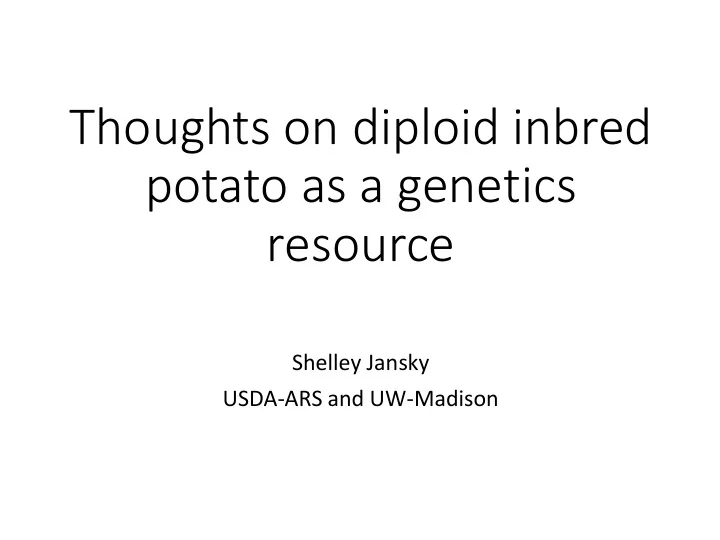

Thoughts on diploid inbred potato as a genetics resource Shelley Jansky USDA-ARS and UW-Madison
Recombinant Inbred Lines M6 ( S. chacoense ) Self-pollinate Line 1 Line 2 Line 3 Line 4 Line 5 Line 100 Fernie and Klee, 2011
Recombinant Inbred Lines • Maintained as true seed • Permanent mapping population • Genotype each line once • Phenotype for multiple traits • Multiple recombination break points • Improved mapping resolution
DM1-3 x M6 F2
DM1-3 x M6 F2 US-W4 x M6 F2
DM1-3 x M6 F2 US-W4 x M6 F2 C545 x M6 F2
DM1-3 x M6 F2 US-W4 x M6 F2 C545 x M6 F2 US-W4 x ber F2
F2 clone F4 family
F2 clone F4 family
Percent heterozygous SNPs 100 80 60 40 20 0 F6 F1 F2 F3 F4 F5 DM1-3 x M6
Percent heterozygous SNPs 100 80 60 40 20 0 F6 F1 F2 F3 F4 F5 DM1-3 x M6
“…the adaptive complexes of two distinct species when split up and segregated in the F1 cannot replace each other because the genetic architecture of the two species is too distinct. Thus after segregation many of the progeny will lack the full adaptive and developmental gene complexes of one or the other parent and genetic breakdown will occur.” Hawkes (1990)
Self-pollination of hybrids • F2 generation • Hybrid vigor • Hybrid breakdown
Self-pollination of hybrids • F6 generation • Inbreeding depression • Hybrid breakdown
Introgression lines Backcross Line 1 Line 2 Line 3 Line 4 Line 5
Introgression Lines • Each line carries a single DNA segment from the donor parent • All DNA of donor parent is represented in the set of introgression lines • Most DNA in each line is cultivated potato • Improved fertility compared to RILs • Identify QTL that were not detectable in RILs
US-W4 S5-15
Introgression lines US-W4 S5 M6 Backcross Line 1 Line 2 Line 3 Line 4 Line 5 Line 50
Recommend
More recommend